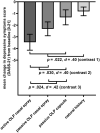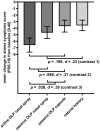The impact of pharmaceutical form and simulated side effects in an open-label-placebo RCT for improving psychological distress in highly stressed students
- PMID: 37076557
- PMCID: PMC10113726
- DOI: 10.1038/s41598-023-32942-5
The impact of pharmaceutical form and simulated side effects in an open-label-placebo RCT for improving psychological distress in highly stressed students
Abstract
Open-label placebo (OLP) may be utilized to reduce psychological distress. Yet, potential contextual effects have not been explored. We investigated the impact of pharmaceutical form and the simulation of side effects in a parallel group RCT (DRKS00030987). A sample of 177 highly stressed university students at risk of depression were randomly assigned by computer generated tables to a 1-week intervention with active or passive OLP nasal spray or passive OLP capsule or a no-treatment control group. After the intervention, groups differed significantly in depressive symptoms but not regarding other outcomes of psychological distress (stress, anxiety, sleep quality, somatization), well-being or treatment expectation. OLP groups benefitted significantly more compared to the no-treatment control group (d = .40), OLP nasal spray groups significantly more than the OLP capsule group (d = .40) and the active OLP group significantly more than the passive OLP groups (d = .42). Interestingly, before intervention, most participants, regardless of group assignment, believed that the OLP capsule would be most beneficial. The effectiveness of OLP treatments seems to be highly influenced by the symptom focus conveyed by the OLP rationale. Moreover, pharmaceutical form and simulation of side effects may modulate efficacy, while explicit treatment expectation seems to play a minor role.
© 2023. The Author(s).
Conflict of interest statement
The authors declare no competing interests.
Figures






Similar articles
-
Analysis of the psychopathological profile, quality of life, and cost-effectiveness of oral lichen planus patients treated with photobiomodulation.Clin Oral Investig. 2022 Jan;26(1):719-728. doi: 10.1007/s00784-021-04050-z. Epub 2021 Jul 12. Clin Oral Investig. 2022. PMID: 34251533 Clinical Trial.
-
Psychological disorders and oral lichen planus: matched case-control study and literature review.Oral Dis. 2016 Apr;22(3):226-34. doi: 10.1111/odi.12423. Epub 2016 Jan 25. Oral Dis. 2016. PMID: 26680999 Review.
-
Validation of the HADS and PSS-10 and psychological status in patients with oral lichen planus.Oral Dis. 2020 Jan;26(1):96-110. doi: 10.1111/odi.13220. Epub 2019 Nov 13. Oral Dis. 2020. PMID: 31650646
-
Oral lichen planus: salival biomarkers cortisol, immunoglobulin A, adiponectin.J Oral Pathol Med. 2016 Mar;45(3):211-7. doi: 10.1111/jop.12345. Epub 2015 Jul 27. J Oral Pathol Med. 2016. PMID: 26216173
-
Depression, anxiety, and stress in oral lichen planus: a systematic review and meta-analysis.Clin Oral Investig. 2022 Feb;26(2):1391-1408. doi: 10.1007/s00784-021-04114-0. Epub 2021 Aug 30. Clin Oral Investig. 2022. PMID: 34460001 Free PMC article.
Cited by
-
Effects of open-label placebos across populations and outcomes: an updated systematic review and meta-analysis of randomized controlled trials.Sci Rep. 2025 Aug 15;15(1):29940. doi: 10.1038/s41598-025-14895-z. Sci Rep. 2025. PMID: 40817381 Free PMC article.
-
Working with patients' treatment expectations - what we can learn from homeopathy.Front Psychol. 2024 May 27;15:1398865. doi: 10.3389/fpsyg.2024.1398865. eCollection 2024. Front Psychol. 2024. PMID: 38860049 Free PMC article. Review.
-
A systematic qualitative review of ethical issues in open label placebo in published research.Sci Rep. 2025 Apr 10;15(1):12268. doi: 10.1038/s41598-025-96425-5. Sci Rep. 2025. PMID: 40210672 Free PMC article.
References
-
- Stallman HM. Psychological distress in university students: A comparison with general population data. Aust. Psychol. 2010;45:249–257. doi: 10.1080/00050067.2010.482109. - DOI
-
- Bergdahl J, Bergdahl M. Perceived stress in adults: prevalence and association of depression, anxiety and medication in a Swedish population. Stress. Health. 2002;18:235–241. doi: 10.1002/smi.946. - DOI
Publication types
MeSH terms
Substances
LinkOut - more resources
Full Text Sources

